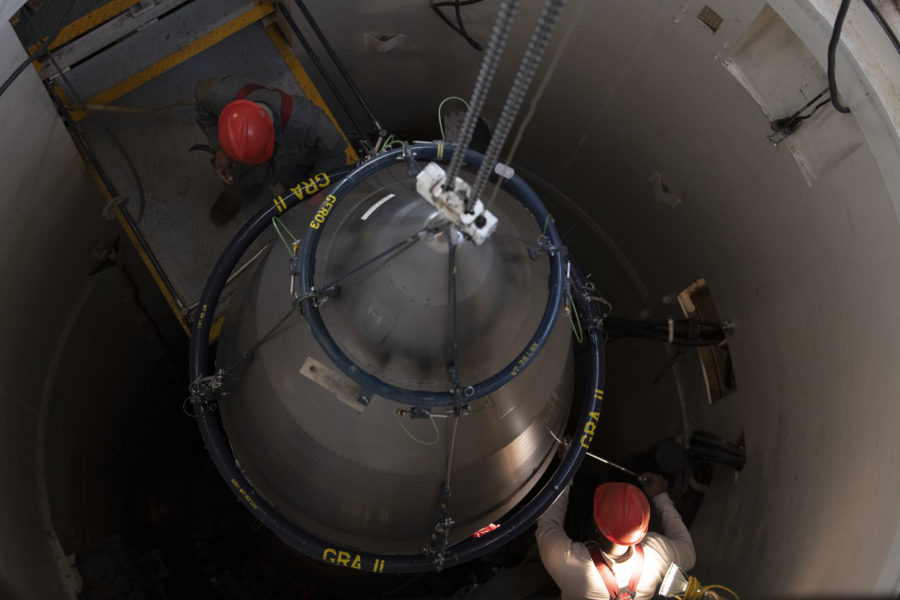Air Force Global Strike Command is launching a new study of cancer risks among Airmen and Guardians who worked near intercontinental ballistic missiles and is developing new resources for current and former service members and their families.
“Air Force Global Strike Command and our Air Force takes the responsibility to protect Airman and Guardians incredibly seriously, and their safety and health continues to be my priority,” said AFGSC Commander Gen. Thomas A. Bussiere in a statement.
The “Missile Community Cancer Study” will examine all intercontinental ballistic missile wings and all personnel who support the Air Force’s ICBM mission, according to AFGSC.
Bussiere commissioned study, to be led by the Air Force School of Aerospace Medicine, asking for an examination of cases of non-Hodgkin lymphoma and other cancers. It is unclear how long the study will take, but the Air Force said it will run in multiple parts and phases, with the results from the initial phase determining subsequent work.
In January, a presentation detailing cancers among missileers who served at Malmstrom Air Force Base, Mont., was posted on Facebook, triggering concern across the missile community and others who have served at Malmstrom, Warren Air Force Base, Wyo., and Minot Air Force Base, N.D. The presentation indicated that at least nine service members from Malmstrom had been diagnosed with non-Hodgkin lymphoma.
Lt. Col. Daniel Sebeck, himself a former missileer and now a Space Force Guardian, created the presentation; it is unclear who posted it on the unofficial Air Force amn/nco/snco Facebook page Jan. 21.
“There are indications of a possible association between cancer and missile combat crew service at Malmstrom AFB,” Sebeck said. Missileers have long worried about the health risks posed by their service, which places them in aging, underground bunkers among a variety of equipment. The Air Force has studied the matter previously, in 2001 and again in 2005. Neither study concluded the community faced serious health risks.
“However,” wrote Seback in his presentation, “21 years later, the study’s conclusion is challenged by the current NHL incidence rate and deserves further attention.”
Sebeck cited “known hazards,” such as chemicals, asbestos, polychlorinated biphenyls, lead, and other materials in ICBM silos and bases which might be potential causes of health issues.
When his comments and findings went public, Bussiere organized a team to try to address the concerns, and held two townhalls to ease concerns in late January. He told Airmen then that he was working with Air Force senior leaders and medical professionals to ensure their worries got the attention they deserved.
“I want a deep understanding of any potential risk there is or could be to our Airmen and Guardians and to the force,” Bussiere said at the time. “This is not about one base, one AFSC, or one rank. It’s about all Airmen of all AFSCs that support our mission and about all of our locations and operating environments.”
AFGSC later released the questions and answers Bussiere, AFGSC Chief Master Sgt. Melvina A. Smith, and AFGSC Surgeon General Col. Lee D. Williams provided during the town halls and encouraged past and present Airmen, Guardians, and family members to come forward with concerns.
The command is now formalizing its response to the issue with a new website that offers detailed questions and answers. Officials promised the site will be continuously updated. The command said it wants missileers to come forward with any concerns and/or to talk with their doctors. The website provides information about non-Hodgkin lymphoma, the two previous Air Force reports on the issue, and a statement from Bussiere assuring Airmen of his commitment to finding any links between work around missile silos and cancer.
Meanwhile, the formal health study will begin to “conduct a formal assessment that addresses specific cancer concerns raised by missile community members across related career fields and also examines the possibility of clusters of Non-Hodgkin’s Lymphoma at intercontinental ballistic missile bases,” according to AFGSC.
“The study will have two study teams and be divided into multiple pieces allowing for a better focus on specific needs, prioritization of the study focuses, and enables the best use of resources and time,” AFGSC added.
The study will draw on active-duty medical data, the Department of Veterans Affairs’ cancer and mortality data, and public cancer registers, according to Williams.
“It is my personal pledge to all Strikers, Airmen, Guardians and family members–past and present–to remain transparent throughout this process and we will continue to maintain an open dialogue,” Bussiere said. “This is my priority.”
